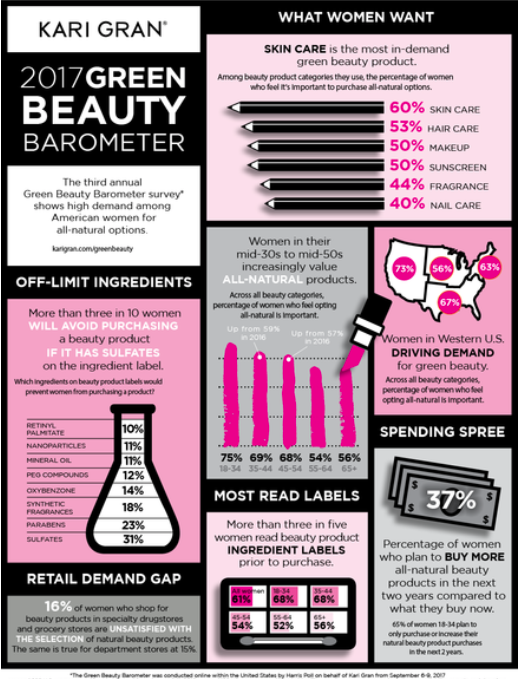Lack of Inclusivity in Vegan and Green Beauty
Photo Credit: Urban Vybe
Since I was 18 years old, I longed to join people who I admired, like The Natural Junkie and Indigo and Canary, that spoke boldly of clean beauty. I would walk into green beauty stores, like Terra 20, Whole Foods, and Herb and Spice and admire the products without buying them. With time, I started changing my habits - going vegetarian, then vegan, and switching to more organic products. However, it has been a problem finding beauty products that are vegan and cater to darker skinned women - from dealing with sunscreen that makes me look like I’m cosplaying as Mystique, to trying to find foundation that is darker than my concealer shade (Kat Von D - deep 34).
In the United States and Canada, there has been a spike in the demand for green and vegan skin care. Last year’s results from the annual green beauty barometer showed that 3 in 4 women aged 18-34 think purchasing green products is important to them. This survey also said that more than half of the women read labels before making a purchase. The increase in demand for these products has put pressure on the beauty industry. Previously I had to go to speciality stores to buy certain organic products, but now almost every cosmetics aisle has a section for green and/or vegan beauty. So why aren’t there more companies that cater to darker skinned people?
I thought that living in a city where I was usually the only dark-skinned person to walk into a green beauty store was why I had a hard time finding sunscreen that didn’t turn me blue or a foundation that could match my skin. Yet even when I went online the products available to me were dismal and in some cases, didn’t exist at all. The struggle to find beauty products for darker skin tones wasn’t exclusive to me; even people I look up to, like clean lifestyle blogger Asakemi, has posted more than once about her inability to let go of her Maybelline foundation because she has been unable to find a green beauty replacement.
There are about 3 ½ more results for the terms “beauty and dark skin” than the terms “green beauty and dark skin” on YouTube. The results are mainly white or white passing people talking about green beauty, or dark skinned people complaining about the lack of options available. While there are a few brands that provide foundation shades for dark skinned people, many natural and organic cosmetic brands are not inclusive when making their shade ranges. It seems like the companies decide to “gift” darker skinned people with one or two shades that are usually quite red and would make most people look like an oompa lompa. The shade range for products like bronzers and concealers for contouring are so little that they are laughable. Sometimes, the contouring colours do not even go up to the shades of foundation available, as if the decision to create shades for darker skinned people was an afterthought, a hasty decision made in order to avoid potential backlash.
But companies are not only falling short when it comes to complexion product. There’s also been a lack of consideration when making pigmented products. From blushes to lipsticks and lipliners, the products are formulated in such a way that their colours do not show up on dark skin or do not flatter dark skin. Blushes are often too light so they show up on the skin in ways that look embarrassing, or lacking in pigment such that they are simply absorbed into darker skin tones. Many of the nude lipsticks and lip liners are so pale that even using a lip liner and foundation cannot protect dark skinned people from the stark contrast between their lips and skin colour.
Even when it comes to formulating skin care products like sunscreen, an essential product for everyone regardless of skin tone, green and vegan beauty brands have failed to provide these products for dark skinned people. Green beauty brands tend to shy away from chemical sunscreens because of the harmful chemicals that are used to make them. This means that they have to focus on physical sunscreens (sunscreens formulated with zinc oxide) which sometimes have a reputation of leaving a white or gray cast on lighter skin tones, but on darker skin tones, that cast can be blue or even purple. Many of these brands boast that their sunscreens are formulated to go on without a white or grey cast, but it seems like they forgot to think about the way sunscreen shows up on dark skin. When I was looking for sunscreen, I went to over 5 stores in my city, trying to find one that didn’t go purple or blue on my skin. But it didn’t matter whether the sunscreen was white, clear or even tinted, it always gave me a blue or purple cast. Yet when the white attendants in the stores tried them, it would melt right into their skin. I was left with no choice but to return to the chemical based sunscreens that have damaged my skin in the past.
With research showing that the skin absorbs approximately 64% of chemicals placed on it and the common belief that your face absorbs 5-10 times more chemicals than your body, it is quite disappointing that companies that make green and vegan beauty have failed to consider how their products show up on darker skin tones. It is almost implied that dark skinned customers don’t matter. Maybe these companies rely on the age old excuse of not selling to darker skinned people because they don’t believe they have a market there; an excuse that draws a conclusion without doing the required research or trying to create these products. Brands that create these types of beauty products need to stop ignoring dark skinned people, especially as their products are meant to be for everyone.


